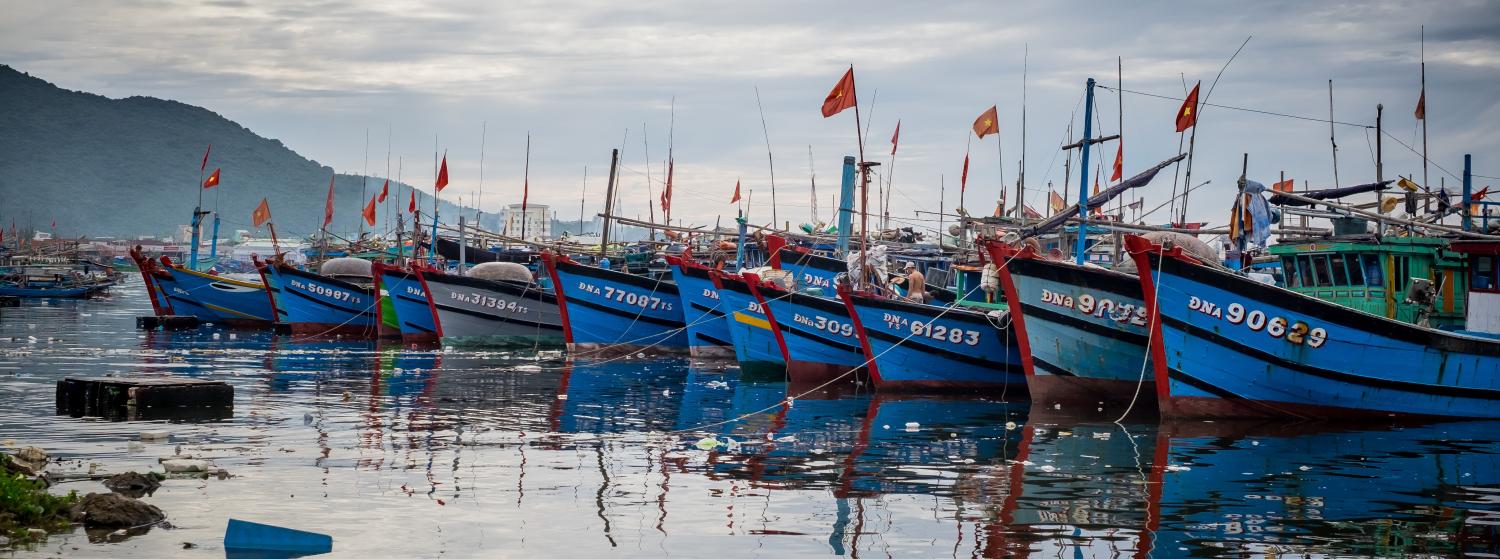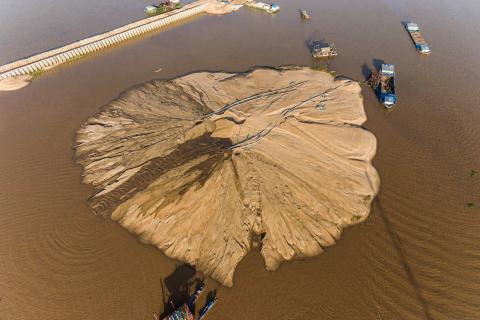Those who have written off last July’s Hague Arbitral Tribunal ruling in the South China Sea as a dead letter should keep an eye on Scarborough Shoal.
Late last week, reports surfaced on Twitter, showing the AIS signals from a flotilla of Vietnamese trawlers close to the shoal. Significantly, Vietnam Coast Guard vessels are also present.
The focus of a bilateral territorial dispute between the Philippines and China, Scarborough Shoal is an isolated rocky outcrop surrounding a lagoon rich in marine life, strategically situated 130 miles west of Luzon – and a long way from Vietnam.
The shoal has been under Beijing’s de facto control since tensions flared in 2012, patrolled by Chinese law enforcement vessels and fishing boats. China’s widely trial-ballooned ambitions to develop Scarborough Shoal as another artificial island and potential military base have attracted strategic attention. An uneasy calm has descended around the feature since the ruling. Chinese and Philippine vessels co-exist in close proximity, while Beijing has pared back its law enforcement presence to a handful of patrol vessels.
President Duterte has repeatedly downplayed Scarborough Shoal as a friction point in Philippines-China relations; recently declaring 'We cannot stop China from doing its thing. Even the Americans were not able to stop them'. Duterte’s officials have proposed a marine reserve prohibiting fishing within the lagoon at Scarborough Shoal, as a means to reduce frictions as well as to conserve the fragile fishery.
The Hague award is considered binding only on the Philippines and China. Questions of sovereignty lay outside its purview. However, the panel judges concluded that Scarborough Shoal is above high water and therefore entitled to a 12-nautical mile territorial sea. Since the award also affirmed that it lies wholly within the Philippines 200 nautical-mile exclusive economic zone (EEZ), this presents a highly unusual situation, given Scarborough Shoal’s potential to generate an exclave territorial sea within the EEZ, if the Philippines does not hold sovereignty.
Although the Hague ruling did not directly address third parties, one of the judges’ most interesting findings, in paragraph 807, is that ‘Scarborough Shoal has been a traditional fishing ground for fishermen of many nationalities, including the Philippines, China (including from Taiwan), and Vietnam'.
Separating government-driven motivations from the commercial pursuit of fish in the South China Sea is notoriously difficult, given far-ranging fishing fleets and general stock depletion. Vietnam has one of the region’s biggest fleets and its fishermen have a reputation for illegal fishing, as far as Australia. However, there is also the interesting possibility that the Vietnamese state is putting fishing rights deliberately to the test at Scarborough Shoal for wider reasons.
By asserting traditional fishing rights at Scarborough Shoal (though one might ask how ‘traditional’ trawlers are), Vietnam has inserted itself directly into the post-ruling narrative. A third-party intervention serves to keeps the Hague award alive, by internationalising it, while making it more difficult for Beijing and Manila to seek an accommodation in ways that could undermine Vietnam’s position more broadly in the South China Sea. Manila recently announced a bilateral coordination mechanism on the South China Sea, with Beijing, due to commence in May. This may have raised Vietnam’s diplomatic concerns.
Vietnam stands to gain considerably from the Philippines’ arbitration verdict, especially its consummate rejection of China’s dashed-line claims, which intrude far into Vietnam’s EEZ. Hanoi has an active interest in upholding the Award. The Hague judges’ recognition of multi-nation fishing rights at Scarborough Shoal gives Vietnam an ‘in’ to help ‘implement’ the ruling.
On the face of it, Duterte has reasons not to welcome Hanoi’s intervention. First of all, for bringing Vietnam’s broader dispute with China to the Philippines’ doorstep when his priority is rapprochement with Beijing. Second, Vietnamese fishermen are no strangers to Scarborough Shoal, but their presence in such numbers may upset their Filipino counterparts. Third, the presence of Vietnamese maritime law enforcement vessels could be construed as reviving a latent claim to Scarborough Shoal’s sovereignty.
But in the current climate it makes no sense for Vietnam to isolate itself on the South China Sea by alienating its fellow ‘frontline’ claimant. Particularly so, when Manila sits in the ASEAN chair and presides over the Code of Conduct negotiations with Beijing. That would be handing a strategic gift to China.
It is much more likely that Vietnam consulted with the Philippines in advance. The defence and security relationship between Hanoi and Manila is close. Duterte reaffirmed the strategic partnership on his visit to Hanoi last September, including a strongly worded joint statement upholding 'freedom of navigation and overflight as well as unimpeded commerce in the region, particularly in the South China Sea'. Defence Minister Delfin Lorenzana recently voiced concerns about China’s intentions at Scarborough Shoal that appeared at cross-purposes with his boss’ public nonchalance. In fact, Duterte may even tacitly approve of Vietnam’s action for added leverage over China ahead of May’s bilateral negotiations: a ‘bad coast guard’ to complement the Philippines continuing ‘good cop’ act.
As long as the Philippines recognises the rights of Vietnamese fishermen in accordance with the tribunal ruling, and Vietnamese fishermen stay out of the lagoon, the latter can claim legitimacy from the Hague award. As well as encouraging Manila to keep the Award in play diplomatically, this move puts the burden of escalation at Scarborough Shoal onto China, a risk that Vietnam proved it was willing to take during the 2014 oil-rig standoff. Hanoi could be calculating that China is currently unwilling to risk inflaming tensions with ASEAN.
Viewed through this lens, the arrival of Vietnamese fishermen off Scarborough Shoal is an imaginative way of regaining the initiative lost to China since last July. If China can be nudged into compliance with the Hague Award, by permitting Vietnamese fishing at Scarborough Shoal (as apparently it did, even in 2012), Hanoi may not only help to forestall the construction of a new artificial island, it could build on this precedent in the Spratly Islands and Paracel Islands, where the harassment of Vietnamese fishermen is a perennial, high-priority concern. Since the Hague ruling, Hanoi has noticeably emphasised the protection of fisheries and fishermen, including legal measures under consideration. It also regards its coast guard’s activities as exercising freedom of navigation, albeit broadly defined.
If this is indeed a coordinated action between Vietnam and the Philippines, it speaks to a growing security bilateralism among certain ASEAN members, offsetting the grouping’s institutional drift on the South China Sea, and perhaps as an insurance policy against Duterte using his role as ASEAN/East Asia Summit host this year to act as spoiler. Uncertainty about the US’ willingness, under President Trump, to push back against China in the South China Sea is a further forcing factor.
The appearance of a Vietnamese fishing flotilla near one of the South China Sea’s most remote flashpoints is not just about catching fish. Hanoi’s legal and diplomatic motivations run deeper. It will be interesting to see if China reacts. The Hague tribunal ruling, meanwhile, remains in play.

